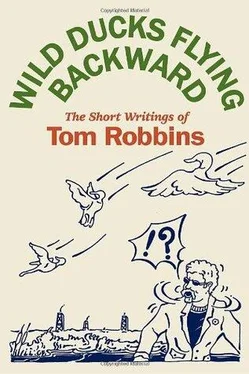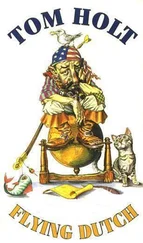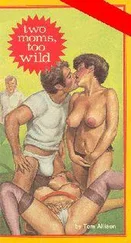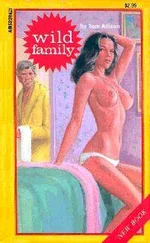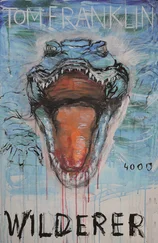Many of us feel trapped, oppressed, compromised by the excess of material goods that surround and sometimes beleaguer us. Yet, despite our expressed intention to simplify our existence, we continue to amass objects of all uses and sizes — to save us time, bolster our status, extend our egos, or insulate us falsely against the approaching December of death. The possibility that the things themselves might possess a personality, an energy, a matrix of meaning beyond the pragmatic, beyond the symbolic, beyond the totemic, beyond the aesthetic, even, is a notion that normally eludes us. Apparently, it did not elude Ken Cory.
If art deals with the philosophy of life, and craft with the philosophy of materials, Cory — like one of those sweet pink dumb phallic erasers he admired — scuffed out the line between the two (much as, on a more specific level, he blurred the boundary between elegance and funk).
His ornaments have been called “tiny sculptures,” but that seems not quite exact. They are too theatrical, too narrative, to fit any formalist definition of sculpture. More accurately, they are tiny tableaus. A Cory creation may function as a pin, an ashtray, or a buckle, but what he has actually produced is a miniature environment. He constructed little worlds. And in those small worlds he made his secret home.
If the objects and images he so meticulously fashioned and fervently collected reflect his personal proclivities, they also, simultaneously, reveal the hidden character of the things themselves. In other words, Cory did not merely endow his pieces with humor, bawdiness, poetry, vitality, beauty, and mystery, he had the vision to recognize that those qualities were implicit in the “objective” materials all along.
Like the ancients, Ken Cory moved in a divinely animated universe — animated even when it was static and mute, divine even when it was goofy and crass.
Drawn to junkyards, garage sales, and hardware stores the way a mystic is drawn to a mountaintop, a satyr to a rutting ground, or a beekeeper to a hive, Cory clearly needed the theater of object-hood. Perhaps it needed him, as well.
Tacoma Art Museum, 1997
Write About One of Your Favorite Things
To pragmatists, the letter Z is nothing more than a phonetically symbolic glyph, a minor sign easily learned, readily assimilated, and occasionally deployed in the course of a literate life. To cynics, Z is just an S with a stick up its butt.
Well, true enough, any word worth repeating is greater than the sum of its parts; and the particular word-part Z —angular, whereas S is curvaceous — can, from a certain perspective, appear anally wired (although Z is far too sophisticated to throw up its arms like Y and act as if it had just been goosed).
On those of us neither prosaic nor jaded, however, those whom the Fates have chosen to monitor such things, Z has had an impact above and beyond its signifying function. A presence in its own right, it’s the most distant and elusive of our twenty-six linguistic atoms; a mysterious, dark figure in an otherwise fairly innocuous lineup, and the sleekest little swimmer ever to take laps in a bowl of alphabet soup.
Scarcely a day of my life has gone by when I’ve not stirred the alphabetical ant nest, yet every time I type or pen the letter Z, I still feel a secret tingle, a tiny thrill. This is partially due to Z ’s relative rarity: my dictionary devotes 99 pages to A words, 138 pages to P, but only 5 pages to words beginning with Z . Then there’s Z ’s exoticness, for, though it’s a component of the English language, it gives the impression of having zipped out of Africa or the ancient Near East of Nebuchadnezzar. Ultimately, perhaps, what is most fascinating about Z is its dual projection of subtle menace and aesthetic grace. Z ’s are not verbal ants; they are bees. Stylish bees. Killer bees. They buzz; they sting.
Z is a whip crack of a letter, a striking viper of a letter, an open jackknife ever ready to cut the cords of convention or peel the peach of lust.
A Z is slick, quick (it’s no accident that automakers call their fastest models Z cars), arcane, eccentric, and always faintly sinister — although its very elegance separates it from the brutish X, that character traditionally associated with all forms of extinction. If X wields a tire iron, Z packs a laser gun. Zap! If X is Mike Hammer, Z is James Bond. (For reasons known only to the British, a Z 007 would pronounce its name “zed.”) If X marks the spot, Z avoids the spot, being too fluid, too cosmopolitan, to remain in one place.
In contrast to that prim, trim, self-absorbed supermodel, I, or to O, the voluptuous, orgasmic, bighearted slut, were Z a woman, she would be a femme fatale, the consonant we love to fear and fear to love.
The celebrities of the alphabet are M and Z, the letters for whom famous movies have been named. Of course, V had its novel, but as I can assure you from personal experience, in today’s culture a novel lacks a movie’s sizzle, not to mention pizzazz. Is it not testimony to Z ’s star power that it is invariably selected to come on last — and this despite the fact that the F word gets all the press?
Take a letter? You bet. I’ll take Z . My favorite country, at least on paper, is Zanzibar; my favorite body of water, the Zuider Zee. ZZ Top is my favorite band, zymology my favorite branch of science (dealing, as it does, with the fermentation of beverages).
Had Zsa Zsa Gabor married Frank Zappa, she would have had the coolest name in the world — except, maybe, if ZaSu Pitts had wed Tristan Tzara. As for me, my given name, Thomas, is a modern, anglicized version of the old prebiblical moniker Tammuz. Originally, Tammuz was a mythological hero who served the Goddess simultaneously as lover, husband, brother, and son. Give me my Z back, and there’s no telling where I might go from there.
Before I go anywhere, however, let me lift a zarf of zinfandel to the former ruling family of Russia. To the tzar, the tzarina, and all the little tzardines! And as for those who would complain that I’m taking this bizzness too far, I say: better a zedophile than a pedophile.
Requested by Esquire, 1996
How Do You Feel About America?
America is a nation of 270 million people: 100 million of them are gangsters, another 100 million are hustlers, 50 million are complete lunatics, and every single one of us is secretly in show business. Isn’t that fabulous? I mean, how could you fail to have a good time in a country like that? I could live literally anywhere in the world and do what I do, so, obviously, I live in America by choice — not for any patriotic or financial reasons necessarily, but because it’s so interesting there. America may be the least boring country on earth, and this despite the fact that the dullards on the religious right and the dullards on the academic left (the two faces of yankee puritanism) seem to be in competition to see who can do the most to promote compulsory homogenization and institutionalized mediocrity. It won’t work. In America, the chronically wild, persistently haywire, strongly individualistic, surprisingly good-humored, flamboyant con-man hoopla is simply bigger than all of them.
Anthem, Avon Books, 1997
NOTE:The preceding was written several years before the military— industrial complex first seized and then cemented total control of the U.S. government, a coup d’état that would have failed without the active assistance of a rapidly growing population of fearful, non-thinking dupes; “true believers” dumbed down and almost comically manipulated by their media, their church, and their state. So be it. Freedom has long proven too heady an elixir for America’s masses, weakened and confused as they are by conflicting commitments to puritanical morality and salacious greed. In the wake of the recent takeover, our prevailing national madness has been ratcheting steadily skyward: the pious semi-literates in the conservative camp tremble and crow, the educated martyrs in the progressive sector writhe and fume. It’s a grand show, from a cosmic perspective, though enjoyment of the spectacle is blunted by the havoc being wreaked on nature and by the developmental abuse inflicted on children. We must bear in mind, however, that the central dynamic of our race has never been a conflict between good and evil but rather between enlightenment and ignorance. Ignorance makes the headlines, wins the medals, doles out the punishment, jingles the coin, yet in its clandestine cubbyholes (and occasionally on the public stage) enlightenment continues to quietly sparkle, its radiance outshining the entire disco ball of history. Its day may or may not come, but no matter. The world as it is! Life as it is! Enlightenment is its own reward.
Читать дальше
